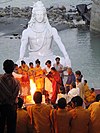
Back Dharma AF دارما Arabic Dharma AST Dharma AZ Дхарма BE Дгарма BE-X-OLD Дхарма Bulgarian धर्म BH ধর্ম (ভারতীয় দর্শন) Bengali/Bangla ལྷ་ཆོས། BO
An dharma (Sanskrito: धर्म, romanisado: dharma; Pali: dhamma) sarong mayor na konsepto na may dakol na kahulogan sa mga relihiyon na Indiyan, arog kan Hinduismo, Budhismo, Jainismo, Sikhismo asin iba pa.[7]
Minsan ngani mayo nin direktang traduksion na sarong kataga para sa dharma an mga lenguaheng Europeo, iyan parateng tinatradusir na "katanosan," "merit" o "relihioso asin moral na mga obligasyon" na namamahala sa indibiduwal na gawe.[8][9]
Sa Hinduismo, an dharma saro sa apat na elemento kan Puruṣārtha, an mga katuyohan sa buhay, asin nangangahulogan nin mga paggawe na ibinibilang na kaoyon kan ⁇ ta, an pagboot na nagpapagin posible kan buhay asin uniberso. Kaiba diyan an mga obligasyon, diretso, ley, gawe - gawe, birtud asin "tamang paagi nin pamumuhay.."[10]
Sa Budhismo, an dharma nangangahulogan "kosmikong ley asin orden," siring kan ipinahayag kan mga katokdoan kan Budha.[11][11] Sa pilosopiyang Budhista, an dhamma/dharma iyo man an termino para sa "ngangalasan."[12]
Dharma sa Jainismo an mga katokdoan ni Tirthankara (Jina) asin an grupo nin doktrina manongod sa pagdalisay asin pagbabago sa moral kan mga tawo.
Sa Sikhismo, an dharma nangangahulogan nin dalan nin katanosan asin tamang relihiyosong kaugalean asin sadiring moral na mga obligasyon sa Dios.
An ideya nin dharma ginagamit na sa historikong relihiyon na Vedic, asin an kahulogan asin ideya kaiyan nag - ebolusyon sa nagkapirang milenya.[13] An suanoy na teksto sa moral na Tamil na Tirukkuṟaḷ, apisar na koleksiyon nin mga katokdoan na aphoristiko sa dharma (aram), artha (porul), asin kama (inpam), an biyo asin eksklusibong basado sa sarong ⁇ am, an terminong Tamil para sa dharma. Siring kan iba pang elemento kan Puruṣārtha, an konsepto nin dharma iyo an pankagabsan na Indian.[14][15]
An katagang kabaliktaran nin dharma iyo an adharma.
- ↑ Gavin Flood (1994), Hinduism, in Jean Holm, John Bowker (Editors) – Rites of Passages, ISBN 1-85567-102-6, Chapter 3; Quote – "Rites of passage are dharma in action."; "Rites of passage, a category of rituals,..."
- ↑ see:
- David Frawley (2009), Yoga and Ayurveda: Self-Healing and Self-Realization, ISBN 978-0-9149-5581-8; Quote – "Yoga is a dharmic approach to the spiritual life...";
- Mark Harvey (1986), The Secular as Sacred?, Modern Asian Studies, 20(2), pp. 321–331.
- ↑ see below:
- J. A. B. van Buitenen (1957), "Dharma and Moksa", Philosophy East and West, 7(1/2), pp. 33–40;
- James Fitzgerald (2004), "Dharma and its Translation in the Mahābhārata", Journal of Indian philosophy, 32(5), pp. 671–685; Quote – "virtues enter the general topic of dharma as 'common, or general, dharma', ..."
- ↑ Bernard S. Jackson (1975), "From dharma to law", The American Journal of Comparative Law, Vol. 23, No. 3 (Summer, 1975), pp. 490–512.
- ↑ Harold Coward (2004), "Hindu bioethics for the twenty-first century", JAMA: The Journal of the American Medical Association, 291(22), pp. 2759–2760; Quote – "Hindu stages of life approach (ashrama dharma)..."
- ↑ see:
- Austin Creel (1975), "The Reexamination of Dharma in Hindu Ethics", Philosophy East and West, 25(2), pp. 161–173; Quote – "Dharma pointed to duty, and specified duties..";
- Gisela Trommsdorff (2012), Development of "agentic" regulation in cultural context: the role of self and world views, Child Development Perspectives, 6(1), pp. 19–26.; Quote – "Neglect of one's duties (dharma – sacred duties toward oneself, the family, the community, and humanity) is seen as an indicator of immaturity."
- ↑ Longman Pronunciation Dictionary
- ↑ See:
- ↑ Britannica, The Editors of Encyclopaedia. (9 April 2019) "Dharma".
- ↑ see: *"Dharma", The Columbia Encyclopedia, 6th Ed. (2013), Columbia University Press, Gale, ISBN 978-0-7876-5015-5; *Steven Rosen (2006), Essential Hinduism, Praeger, ISBN 0-275-99006-0, Chapter 3.
- ↑ 11.0 11.1 "dhamma", The New Concise Pali English Dictionary.
- ↑ David Kalupahana.
- ↑ see:
- ↑ N. Sanjeevi (2006). First All India Tirukkural Seminar Papers (2nd ed.). Chennai: University of Madras.
- ↑ N. Velusamy and Moses Michael Faraday (Eds.) (2017). Why Should Thirukkural Be Declared the National Book of India? (in Tamil and English) (First ed.). Chennai: Unique Media Integrators. p. 55. ISBN 978-93-85471-70-4.





